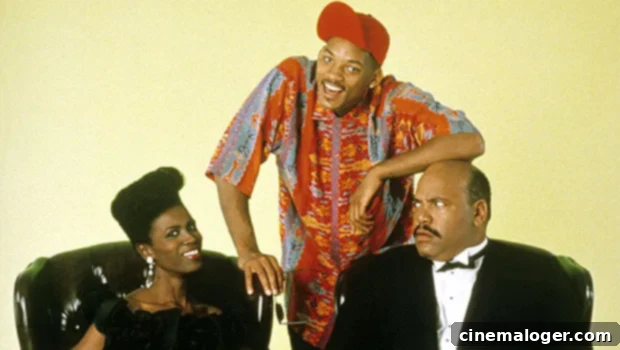Janet Hubert Reflects on Healing After 27-Year Feud with Will Smith: The Fresh Prince Reunion and Beyond
If you purchase an independently reviewed product or service through a link on our website, we may receive an affiliate commission.
For nearly three decades, Janet Hubert, now 64, has carried the burden of a tarnished reputation, stemming from her departure from the iconic sitcom The Fresh Prince of Bel-Air. She battled persistent narratives that painted her as difficult, haughty, and a disruptive force on set. This prolonged struggle, a silent war waged against public perception and Hollywood rumor, left her feeling like a prisoner to a false narrative. Now, following the highly anticipated HBO Max Fresh Prince of Bel-Air reunion special, Janet Hubert describes an profound sense of liberation. She likens her experience to that of a wrongfully convicted individual, who, after years of unjust imprisonment, has finally succeeded in convincing the world of their innocence. Since the reunion began streaming on November 19, fans worldwide have witnessed the deeply emotional moment where Janet hugged and shed tears with her former on-screen nephew, Will Smith. This powerful exchange marked the official end of a lengthy, bitter, and very public feud that had cast a long shadow over both their careers and personal lives for nearly three decades.
The emotional weight lifted from Janet’s shoulders is palpable. Speaking about the experience, she shares, “People keep asking, ‘How do you feel?’ And I [say], ‘Like a person who’s been in prison for 27 years, who knew they didn’t rob the bank; who knew they didn’t kill or murder that person and everybody has accused you.’” This vivid analogy underscores the depth of her suffering and the profound relief she now feels. For years, she lived with the public perception of being a problematic actress, a label that not only impacted her professional opportunities but also took a significant toll on her personal well-being and peace of mind. The reconciliation wasn’t just a brief moment of televised drama; it was the culmination of years of unspoken hurt, misunderstanding, and a yearning for truth to prevail.
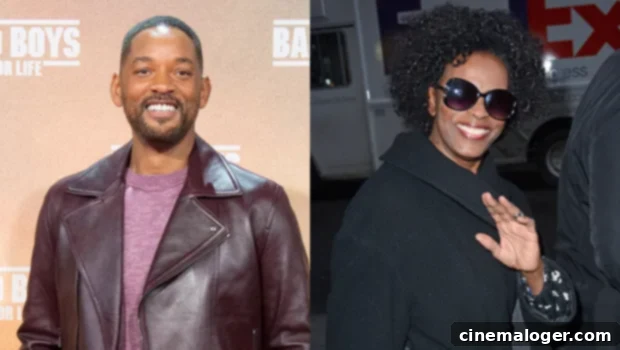
The positive developments extend beyond the initial emotional reunion. Not only does Janet now feel a deep sense of inner peace and vindication, but the heartfelt reconciliation she and Will, 52, shared in front of the cameras was far from a mere performance for ratings. The genuine connection forged during that special moment has continued to blossom. Since their initial reconnection back in September, the acclaimed actress confirms that they have consistently remained in contact, nurturing a renewed relationship built on understanding and mutual respect. This ongoing dialogue signifies a true healing, moving beyond the public spectacle to a more personal and enduring mending of fences.
“Will and I have been corresponding and texting back and forth. It’s just wonderful to have this weight, this albatross from around my neck that was only put there by the media, the cast, talk show hosts,” she tells HollywoodLife EXCLUSIVELY. The metaphor of an “albatross” perfectly captures the oppressive burden she carried for decades. This weight was not of her own making, but rather a creation of external forces—media narratives that sensationalized conflict, cast members who may have inadvertently contributed to the narrative, and talk show hosts who perpetuated the feud. The feeling of finally being free from this heavy burden is transformative, allowing Janet to reclaim her peace and focus on a more positive future, unencumbered by past resentments.
Janet Hubert’s frustration and her stated disdain to “despise fame” are entirely understandable given the trajectory of her career and personal life following her departure from *The Fresh Prince of Bel-Air*. When the groundbreaking sitcom first debuted in 1990, it was an instant cultural phenomenon and a monumental hit. The show not only launched a young rapper from Philadelphia, Will Smith, into superstardom, transforming him into a bankable, Oscar-nominated Hollywood powerhouse, but it also propelled Janet—an already acclaimed Broadway actress—into worldwide exposure and garnered her legions of new fans. As Will’s original on-screen Aunt Viv, she embodied a character that was poised, elegant, and sophisticated, boasting a striking bone structure, a quick wit, and a famously sharp tongue. Aunt Viv was not one to suffer fools gladly and possessed the ability to effectively challenge anyone with a cold, piercing glare, earning her immense respect and adoration from viewers. Her portrayal set a high bar for strong, intelligent Black female characters on television.
Beyond her dignified demeanor, Aunt Viv was also incredibly fun-loving and multifaceted. The fictional college professor, who resided in the opulent neighborhood of Bel-Air with her esteemed lawyer husband and their three children, could effortlessly transition from academic intellectual to a spirited woman ready to “get down with the best of them.” She famously displayed moments of fierce independence and an unyielding readiness to “whip off her earrings to fight” if the situation demanded it, showcasing a dynamic and compelling personality that resonated deeply with audiences. Her ability to balance gravitas with a relatable, feisty spirit made her an integral and beloved part of the Banks family dynamic, making her sudden disappearance from the show all the more impactful and puzzling for devoted fans. Her absence left a void that was difficult for many to reconcile, fueling years of speculation and debate about the true reasons behind her exit.
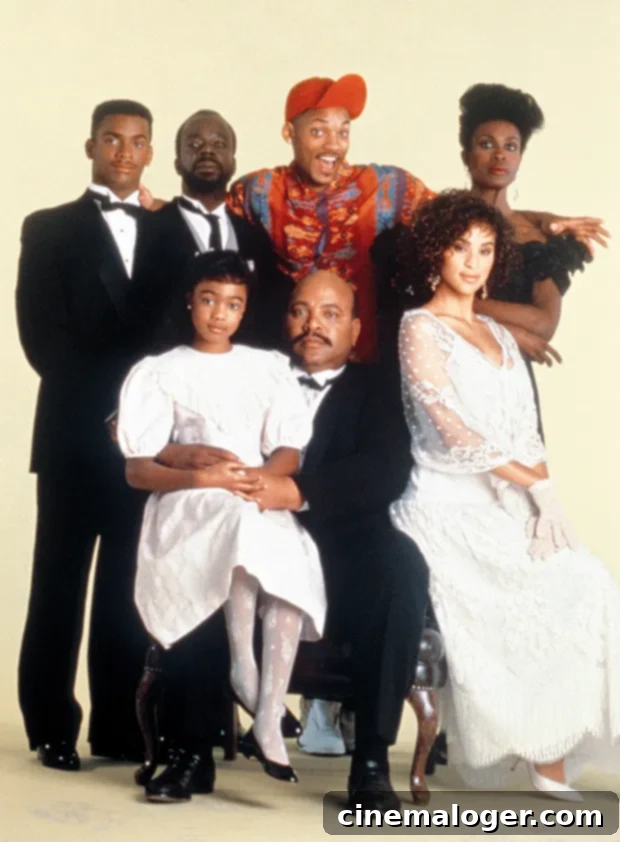
Then, abruptly, she was gone. From Season 4 onwards, actress Daphne Maxwell Reid took on the pivotal role of Aunt Viv, marking a noticeable shift in the show’s dynamic. This sudden change sparked widespread confusion and fueled a persistent public narrative that unfairly villainized Janet Hubert. As she revealed during the reunion special, “The misconception of me was that I was haughty, difficult, wanted to be the star of the show.” This damaging reputation, though largely unfounded, haunted her throughout her career. The fallout was devastating: she lost nearly everything, including her home, as job opportunities dried up and the industry seemed to turn its back on her. The cost of these public misconceptions extended far beyond professional setbacks, deeply affecting her financial stability and personal life for years.
The actual truth behind Janet Hubert’s departure, as she courageously clarified on the HBO Max reunion special, was far more complex and heartbreaking than the circulating rumors. In reality, she disclosed that she had only been offered an onerous 10-week contract that severely restricted her ability to work for any other production. This was a deal that, financially, she simply could not afford to accept, especially as an actress needing consistent work. Furthermore, she recounted feeling isolated and “banished” to her dressing room between takes, largely because she didn’t engage in the lighthearted banter and laughter at Will Smith’s jokes on set. What Will Smith and others on set didn’t realize at the time, and what he seemed genuinely stunned to learn during their reunion, was the immense personal struggle Janet was enduring. At that point in her life, she was pregnant and navigating the profound difficulties of an unhappy marriage, facing her own deeply personal and overwhelming challenges. Consequently, being cheerful and joking on a television set was understandably not at the forefront of her mind or her emotional capacity. This revelation provided crucial context, transforming the narrative from one of an uncooperative actress to that of a woman silently battling significant personal hardship while trying to maintain her professional responsibilities.
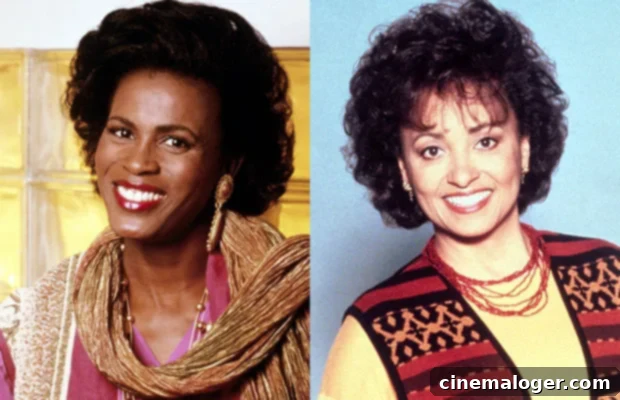
Despite Janet’s truth, the damaging myth of her being difficult to work with stubbornly persisted for decades, profoundly impacting her career and personal peace. It was this enduring narrative that, ironically, helped to set in motion the very events that led to the eventual reconciliation. A pivotal moment occurred during an August 2020 interview on the Hip Hop Uncensoredpodcast, where Joseph Marcell, who famously played Geoffrey, the beloved British butler on the show, publicly addressed the long-standing feud. While expressing his respect for Janet, Marcell inadvertently reignited the old wounds by suggesting she struggled to accept that Will Smith was the undeniable star of the sitcom. “I feel that perhaps Janet was not able to deal with that,” he commented. These words, coming from a former colleague, although perhaps not maliciously intended, further solidified the existing narrative and pushed Janet to her breaking point, creating an urgent need for her to finally confront and dismantle the decades-old misconceptions that had overshadowed her legacy.
Janet vividly recalls the immense pain these comments caused. “[That] really put me in hell,” she says of Joseph Marcell’s interview, “and I was trying to understand why he did it.” It was around this same emotionally charged period that she learned about the impending HBO Max reunion special. Seizing this unexpected opportunity for truth and resolution, Janet took decisive action. She wrote compelling letters to both the network and to Red Table Talk, the popular Facebook Watch show co-hosted by Will Smith’s wife Jada Pinkett Smith, their daughter Willow, and Jada’s mother Adrienne Banfield-Norris. In her correspondence, the actress laid down a direct and powerful challenge, demanding a face-to-face confrontation to finally set the record straight and reclaim her narrative. This courageous step demonstrated her unwavering resolve to put an end to the pervasive rumors that had plagued her for far too long, marking a critical turning point in her long quest for redemption.
In her impassioned plea to the powers that be and to Will himself, Janet Hubert delivered a clear ultimatum. She declared, “I said, ‘Either you sit down with me and the cast sit down with me and we clear this, because only you and I, Will, know what really happened… or shut up for the rest of your life about it because I’m tired of it and I’m not going to serve…another 30-year sentence for something that I did not do.’” This statement, steeped in decades of frustration and injustice, underscored her refusal to remain silent or continue to endure the public fallout of a narrative she vehemently denied. It was a bold and necessary demand for accountability, highlighting her deep desire for a truthful reckoning that would finally bring closure to the prolonged feud. Her determination to confront the truth, rather than let the misconceptions fester, ultimately paved the way for the historic dialogue that would soon unfold.
To her genuine surprise and immense relief, Will Smith and his production team not only acknowledged her challenge but actively wanted her to participate in the reunion special. This unexpected acceptance was a pivotal moment, signaling a willingness from Will’s side to confront the past and seek reconciliation. The swiftness of the response was equally astonishing; within a mere day of receiving this incredible news, Janet was on a plane from her home in New Jersey, traveling across the country to Los Angeles to film the highly anticipated reunion. This rapid sequence of events emphasized the urgency and importance of the meeting, culminating in a reunion that had been nearly three decades in the making and was poised to rewrite the narrative of one of Hollywood’s most enduring feuds.
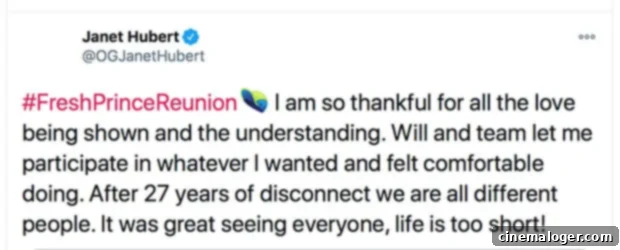
Reflecting on the protracted nature of their feud, Janet Hubert attributes much of the animosity and misunderstanding to the simple fact that she and Will were never “being able to sit down and talk honestly.” This fundamental lack of direct, unfiltered communication allowed rumors to fester and narratives to be shaped by external forces rather than personal truths. She sagely observes, “Power can really make you, sometimes close your ears.” This insightful comment speaks to the inherent dynamics of a power imbalance, where one individual’s rapid ascent to superstardom can inadvertently create a barrier to genuine empathy and understanding. When one holds significant influence over others’ careers and lives, the focus can become self-preservation or simply not perceiving the struggles of those around them. Janet acknowledges Will’s growth, adding, “All one thinks about when one has power over everyone’s life is maybe themselves. And he owned that and I respect that, highly.” This acknowledgment from Will—his acceptance of his part in the misunderstanding and the impact of his actions—was a crucial step towards genuine healing and a testament to his personal evolution. It transformed their decades-long conflict into a powerful lesson in empathy and the importance of direct dialogue.
In a bittersweet twist of fate, the reunion that took 27 years to materialize could have potentially happened much earlier, back in 2009. Janet reveals that she had reached out to Will at that time, intending to make peace and reconcile their differences. However, for reasons unknown or perhaps due to miscommunication, Will stated that her message was never passed on to him. This missed opportunity highlights the numerous obstacles, both intentional and unintentional, that prolonged their estrangement. Nevertheless, despite the long delay, Janet firmly believes that this year, the time was inherently right for their reconciliation. The universe, it seems, finally aligned, allowing for a genuine connection and a much-needed healing process to unfold, free from the external noise and past impediments that had previously kept them apart. The delay, while painful, may have allowed both individuals to mature and gain the perspective necessary for such a profound and lasting reconciliation.
The reasons behind the timing of this long-awaited reconciliation are deeply personal and reflect significant growth from both parties. “He’s a different person and I’m a different person and I want healing,” Janet states, emphasizing the individual journeys they have both undertaken over the years. This desire for healing, rather than dwelling on past grievances, became a powerful catalyst. Moreover, the tumultuous events of 2020 played a significant role in fostering this urgency for peace. As Janet articulates, “It’s 2020 and after the evils of PresidentDonald Trump, four years of that, and COVID, I don’t want this ugly in my life anymore.” The backdrop of global instability, political division, and a worldwide pandemic served as a stark reminder of life’s brevity and the importance of letting go of grudges. As she powerfully summarized in a tweet on November 19, following the premiere of the reunion show, “Life is too short.” This sentiment encapsulates the profound realization that harboring resentment only hinders one’s own peace, making the pursuit of reconciliation not just a choice, but a necessary act of self-care in a world already fraught with challenges. The reunion transcended a mere celebrity event; it became a poignant testament to forgiveness, growth, and the universal human need for peace and understanding.
